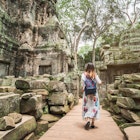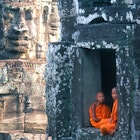
Often overlooked in the global fight against the pandemic, Cambodia has been one of the rare success stories in keeping the virus at bay. Lonely Planet writer Nick Ray has spent the past year living and working in Phnom Penh and shares his experiences.
Cambodia experienced zero deaths in 2020, only recording the first fatality on 11 March 2021. For a country that has never imposed a national lockdown, these are testing times, as the government struggles to stave off the virus with a mix of overnight curfews and inter-provincial travel bans.
Editor's note: during COVID-19 there may be additional travel restrictions. Check the latest guidance in Cambodia from WHO before planning a trip, and always follow local government health advice.
Face masks mandatory in public
Many in Asia wear masks year-round to protect against the dust and heat, but today it is almost universal in the capital Phnom Penh with the threat of fines up to $250 if caught not wearing one. The government relies on public compliance and track and trace technology with more than 100,000 businesses displaying QR codes for customers to scan on entry.

Schools closed in late February this year and cinemas and museums followed in March. Earlier this month, for the first time in the pandemic, restaurants were asked to close for in-premises dining and now offer only takeaway. This is all part of a concerted and coordinated attempt to avoid mass gatherings and celebrations for Chaul Chnam Thmey or Khmer New Year 2565 which falls on 13-16 April. But the boundaries are somewhat blurred in a country where street food is popular and much of life in the city is lived in and around the markets.

Back at the start of the pandemic, Cambodia identified its first case of COVID-19 in a tourist in January 2020. Cambodia implemented tougher restrictions on travellers, suspending tourist visas on arrival and banning certain nationalities for a short period.
No lockdown measures
Cambodia never implemented a lockdown over the past year. The closest it came was when karaoke joints, nightclubs and cinemas were closed, but restaurants, cafes, shops and markets continued to operate normally, and a number of bars stayed open as long as they could serve food.

A significant turning point for the country came on 16 May 2020 when the last COVID-19 patient was discharged from hospital and it coincided with an annual holiday for King Norodom Sihamoni’s birthday. The country breathed a collective sigh of relief and hundreds of thousands of people hit the road to Kep, Kampot, Siem Reap and other destinations.
Phnom Penh was soon back to its wild ways with popular bar strips like Bassac Lane reopening. Cambodia went almost six straight months without a community outbreak. But while it seemed somewhat immune to the health impact of COVID-19, it was not immune to the economic meltdown caused by the collapse of the travel industry.

Tourism accounts for 25% of Cambodia’s GDP. Siem Reap, gateway to the temples of Angkor, is almost entirely reliant on tourism and has become something of a ghost town during COVID-19. I made a number of trips to the temples of Angkor during the pandemic, including an Alone in Angkor Wat feature for Lonely Planet. This iconic Unesco World Heritage site remained open throughout. However, the reality for the tourism industry was that Angkor ticket sales were down by 99.5% in April 2020 compared with one year earlier.

“As you can see around us, do we see any visitors?” my guide Reaksmey ‘Smey’ Chen asks at Angkor Wat. “We pray that the coronavirus will vanish from our planet soon, that people can come once again.” Among almost 1000 hotels, hostels, home-stays and guesthouses in Siem Reap, only about 15% remain operational today. Numerous restaurants, bars and cafes have closed and may never reopen. Temple town is a shadow of its former self and may take five years to recover. “We have to deal with our situation at the moment, many people have lost jobs,” adds Smey.
I head to the remote temples of the far north of the country to shoot some videos, including the stunning mountain temple of Preah Vihear where we experienced a privileged pre-opening access to see sunrise over this sacred place. Further south is the remote jungle ruin of Preah Khan Kompong Svay, once the largest temple enclosure of the Khmer empire and the second city to Angkor, where we were the only non-Cambodians to visit in the month of June.
A new normal of no tourists in Cambodia

Life was almost back to normal by Christmas and it was time for a motorbike expedition deep into the Cardamom Mountains, an adventure delayed for six months or more due to the pandemic. Crossing the northern route through Pramouy, we scaled the hairpin bends of the iconic NH55 and descended down a beautiful river valley towards the remote Thai border which was closed to travellers. The road turned to dirt and dust from here, but hugged the border all the way south with occasional glimpses of the Gulf of Thailand’s iconic islands to the west and the dense jungle of Phnom Samkos, Cambodia’s second highest peak, to the east.

The trip took in some stunning roads across this remote region that is slowly opening up to the rest of Cambodia. However, eventually luck - and the roads - ran out when we attempted an old trail through the eastern swathe of mountains from Kravanh to Kompong Speu. My bike was leaking oil and overheating and eventually shuddered to a halt about 30km from civilization. Fortunately, there is always a friendly neighbourhood coyonne (local tractor) in the most remote part of Cambodia and my bike was dispatched to a nearby farm for some R ‘n’ R.

As the darkness of 2020 gave way to a brighter dawn in 2021, there was optimism that Cambodia was turning a corner with zero deaths and no community transmission. The only cases in the country were those identified by compulsory testing for international arrivals at the airports who were then quarantined for two weeks. Vaccines began to roll out globally and Cambodia received its first batches of the Astra-Zeneca COVISHIELD vaccines from the COVAX Alliance and the Sinopharm and Sinovac vaccines from China. It seemed Cambodia was finally on the long road to recovery.
However, as many countries have discovered, the virus will find a way back into circulation. For Cambodia, it came with a security breach that saw four visitors bribe their way out of a designated quarantine hotel. This kickstarted Cambodia’s first serious community outbreak that has since sparked more than 3000 cases and 29 deaths. Despite the current community outbreak, Cambodia has fewer than 5000 cases to date.

Why has Cambodia low COVID rates?
Theories abound as to why Cambodia and the countries of the Mekong region have coped so well during COVID-19. One scientific theory under investigation lies in the origins of the virus in the bats of the region. One bat sample found in a cave in northern Cambodia in 2010 was stored in a freezer in the Pasteur Institute in Phnom Penh for a decade before being analysed during the pandemic and was found to be 92.6% compatible the COVID-19 virus.
Speaking to Dr Erik Karlsson, deputy head of Virology at the Institut Pasteur du Cambodge (IPC) in Phnom Penh, he explains: “what we do know is that there are bat species in the region that carry cousins or ancestors of this virus. They are not 100% SARS-CoV-2, they are 96%, they are 92%.” This has led some scientists to draw the conclusion that the endemic bats in the Mekong region are affording the local population some level of natural immunity to COVID-19 due to previous exposure to viruses from the same family. Dr Karlsson stresses this theory is unproven: “they (the ancestor viruses) are missing critical elements of this virus like the receptor binding areas that are completely different from the one that is affecting humans.”

Discussing the many possible reasons for the Cambodia success story to date, Dr Karlsson continues, “the Cambodian government has shown a high degree of responsiveness to COVID-19, including the necessary strong measures required,” he says. “Then there is the young population, the climate and the culture of wearing masks as well.”
Navigating a safe path out of the pandemic while protecting public health and promoting economic recovery will be a big challenge. An estimated US$5 billion has been lost to the pandemic through the collapse of tourism.

Looking into the travel industry crystal ball has led to many misguided predictions during the pandemic, but it is accurate to say that there will not be a better time to visit the majestic temples of Angkor than before the restart of mass tourism. Number one on Lonely Planet’s original Ultimate Travel List, the temples of Angkor represent arguably the most socially-distanced World Heritage site on earth with more than 70 major temples scattered across 1000 sq km. Not forgetting the fact that Angkor Wat is widely acknowledged to the largest religious building in the world.
However, first Cambodia will have to safely navigate its way out of its first major community spread. The current predicament facing Cambodia is a timely reminder of what the WHO has said from the outset, that “no country is safe until all countries are safe”.
You may also like:
Angkor Wat: get to know Cambodia's most iconic temple
Caving, diving, trekking and more: finding adventure in Cambodia
Battambang: Cambodia's lesser-known city
Explore related stories




 Public TransportHere's how to get around Cambodia: your guide to one of Southeast Asia's great adventures
Public TransportHere's how to get around Cambodia: your guide to one of Southeast Asia's great adventuresMar 28, 2022 • 9 min read

 Destination PracticalitiesWhat you need to know before visiting Cambodia: health care, currency, and culture
Destination PracticalitiesWhat you need to know before visiting Cambodia: health care, currency, and cultureMar 26, 2022 • 6 min read
 Budget TravelHow to visit Cambodia on a budget: top tips to stretch your money further
Budget TravelHow to visit Cambodia on a budget: top tips to stretch your money furtherMar 25, 2022 • 5 min read
 Festivals & EventsThe best times to visit Cambodia for temple trips, beach days and more
Festivals & EventsThe best times to visit Cambodia for temple trips, beach days and moreMar 24, 2022 • 6 min read


